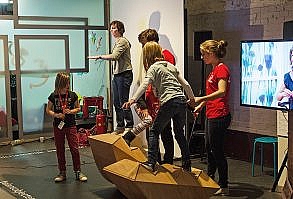Jerome Bruner was a key figure in the development of Discovery Learning which is based on cognitive psychology and described as a method that promotes student engagement with their surroundings through exploration or experiments. Bruner (1961) posits that learners develop their own understanding by organizing and classifying data via the use of a coding system. Bruner argued that the most successful method of developing a coding system is via discovery rather than instruction.
The teacher’s goal should not be to disseminate knowledge through rote memorization but to aid the learning process. This implies that an effective teacher will develop classes to assist pupils in discovering the connections between disparate pieces of knowledge.
The Spiral Curriculum
Bruner (1960) takes a contrary position compared to other explanations, believing that children at any age are capable of comprehending complicated information.
“We begin with the hypothesis that any subject can be taught effectively in some intellectually honest form to any child at any stage of development.” (p. 33)
Jerome Bruner
This assumption rests on the spiral curriculum method which refers to presenting complicated subjects to be taught much simpler at primary grades and revised with details in the following years. Topics, thus, could be taught at steadily increasing degrees of difficulty (therefore the spiral concept). Teaching via discovery would result in students who can solve issues on their own.
Shortcomings of Discovery Learning
The majority of academics would say that pure discovery learning does not function as a universal and comprehensive teaching method for novice and intermediate learners. The question of how much coaching is required is fairly debatable. Krischner et al. (2006), for example, finds minimal guidance meaningless and ineffective. Additionally, the principles of instruction concept put forward by Merril imply that unguided learning could be possible only with expert learners. Also, the unstructured learning environment might increase student cognitive load.
References
Bruner, J.S. (1967). On knowing: Essays for the left hand. Cambridge, Mass: Harvard University Press
Kirschner, P., Sweller, J., & Clark, R. E. (in press). Why Unguided Learning Does Not Work: An Analysis of the Failure of Discovery Learning, Problem-Based Learning, Experiential Learning and Inquiry-Based Learning. Educational Psychologist.PDF Preprint
Kirschner, P. A., Sweller, J., & Clark, R. E. (2006) Why minimal guidance during instruction does not work: An analysis of the failure of constructivist, discovery, problem-based, experiential, and inquiry-based teaching. Educational Psychologist, 41(2), 75-86 PDF
Please feel free to contact me if you need any further information.





